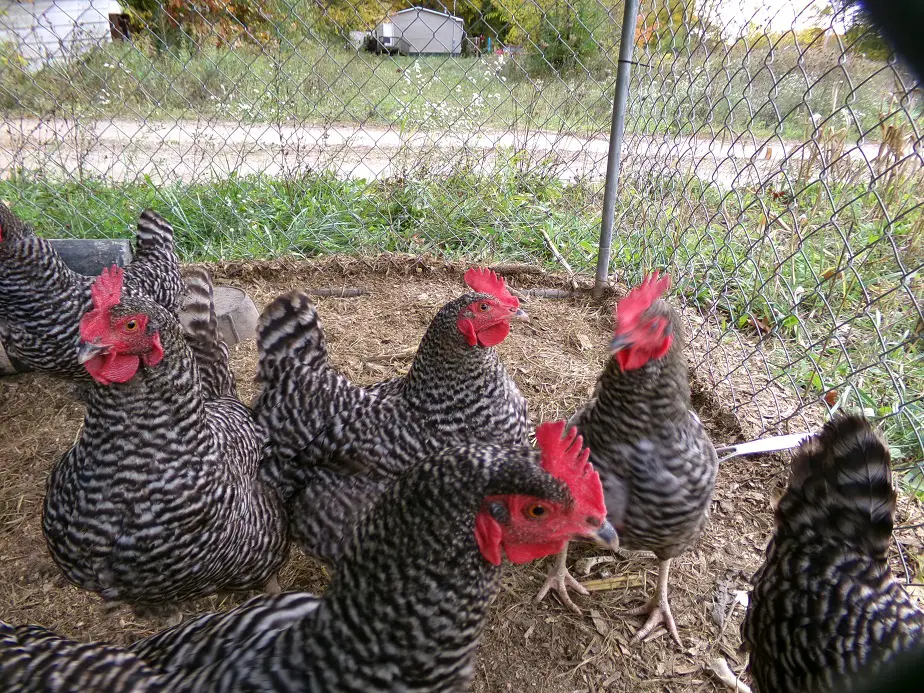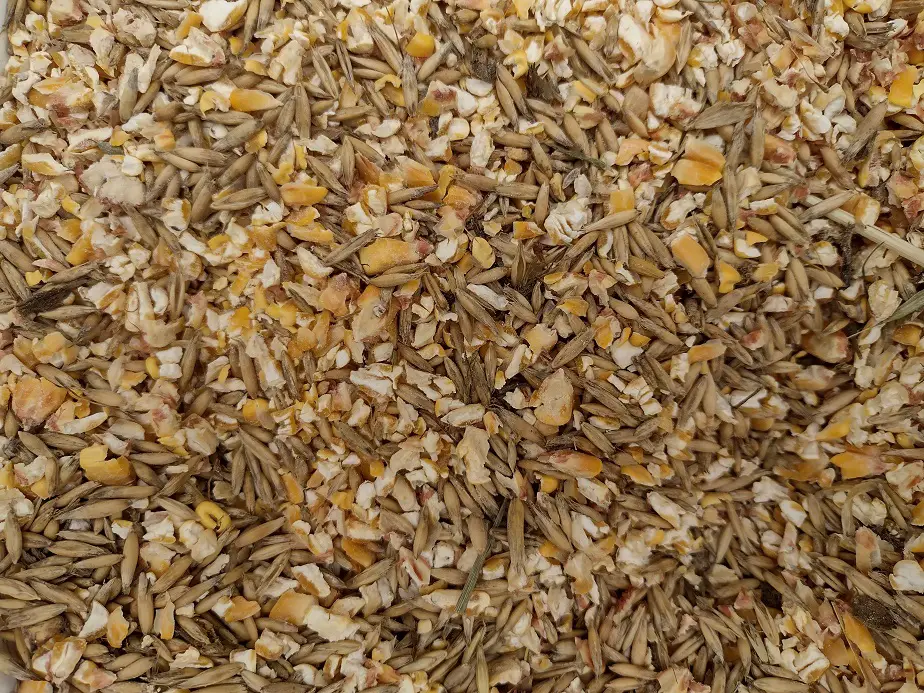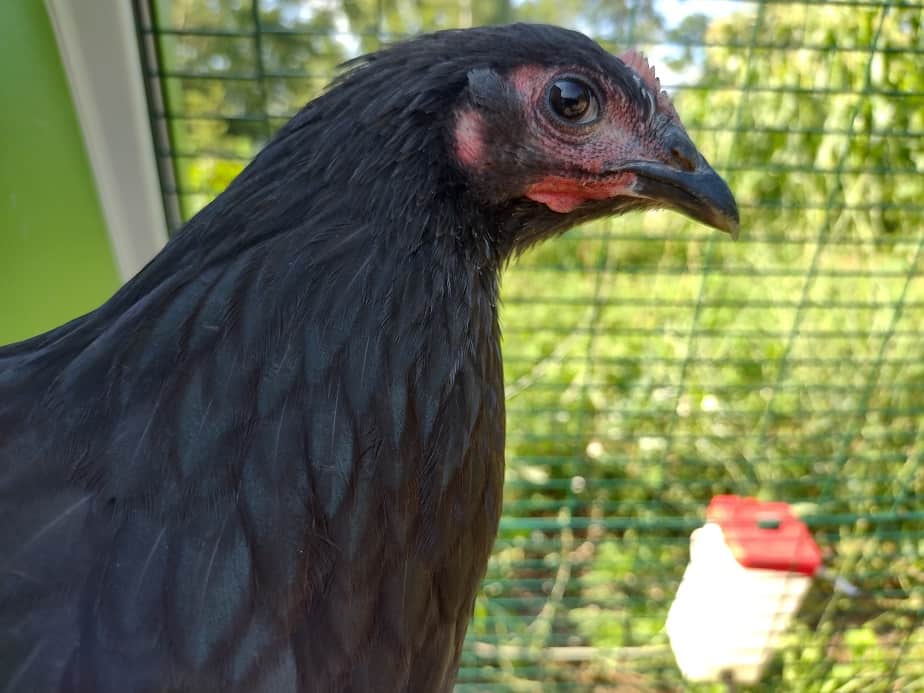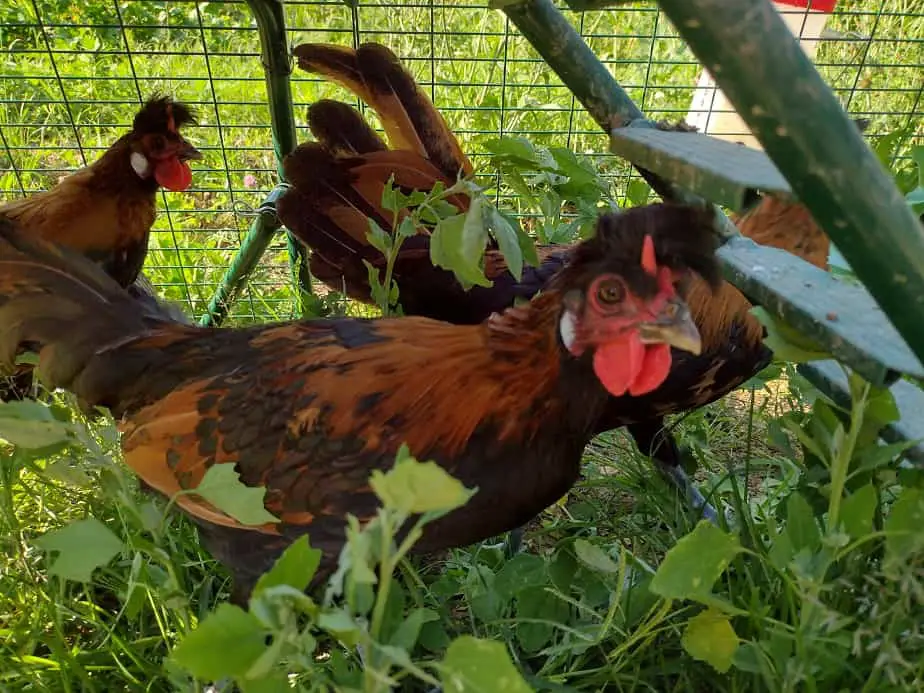I’ve used a lot of organic and non-organic feeds on our farm. Here’s what I’ve learned.
Organic Feed Cannot Contain Harmful Pesticides
Organic chicken feed cannot contain any pesticides known to be directly toxic or harmful to humans or livestock. None of the common commercial pesticides can be used in or around any crop certified for organic feed production.
As far as I’ve seen, all standard feed crops get a decent dose, often several, of pesticides that leave a residue on the crops.
There are some major concerns around the use of pesticides around food and feed crops. Rightly so. All known pesticides have negative effects on more than just problematic pests. The type of pesticides used in commercial grain fields are well known to negatively impact microbiology.
They kill off beneficial bacteria in the soil around crops, increasing issues with pathogens like E. Coli and Salmonella around the feed crop. The reissuance of these pesticides have been shown to possess the same action in the gut of mammals and poultry. It creates an unhealthy gut microbiome and fosters more issues with Coccidiosis, E. Coli, and Salmonella.
If you’re interested in removing agricultural chemicals from your feed, look into fermented feeds and biochar. Both greatly reduce the presence and effects of agricultural chemicals in feed. Here are some articles to read:

Organic Feed Cannot Contain Round-Up
Organic Feed crops cannot have Round-Up or any other pesticide that poses health concerns or that leaves a residue on the crop. The only organic-approved herbicide is agricultural-strength vinegar, adn that’s not commonly used even among organic crops.
Round up, the king of herbicides, is used on almost every farm field in the country more than once per season. It’s sprayed before and during the growing season, and oftentimes it’s used to kill off a crop for harvest. The issue with it is that, even in trace amounts, it’s bad for overall health.
We’ve had studies since it came out in the 80s showing that the chemical Glyphosate (branded as Round-Up) kills not only green plants, but also about 50% of beneficial species of bacteria. These bacteria are needed to keep E. Coli in-check, and to maintain good gut health in mammals and poultry.
The residue remaining on a harvested feed crop is enough to have severely negative impacts on the gut health and the healthy gut-biome of livestock. Now we even have studies on the dangers of consuming meat from animals fed round-up laced feedstuffs.
Since the common GMO is a glyphosate-resistant type of cell structure in plants, Round-Up is used in the field at levels of about fifteen times higher per year than before the GMO shift.
Organic Feed Cannot Contain Most Fungacides
Most fungicides used in feed grains are not allowed on organic feed crops. The most common organic fungicide is copper sulfate, which is thought to pose little or no risk as a feed contaminant. More common fungicides leave trace residue that can pose health concerns and harm the gut microbiome.
The other options I know of are peroxide and peracetic acid, but I can’t really speak much to those other than to say they’re mostly used within the organic produce industry. All common fungicides have significant actions towards creating a dangerous imbalance of microbiology.
You’re probably starting to see a trend of that by now. That really seems to be the biggest issue of all with the common agricultural chemicals. They tend to create an unhealthy environment from the bottom up, and it’s treated by adding more chemicals to the regimen.

Organic Feed Cannot have a GMO Ingredient
You will not find any GMO ingredients in organic chicken feed. Although there is currently no definitive answer as to whether or not GMO technology is harmful, due to customer concerns and mistrust, all GMO crops are banned from any certified organic feed.
Personally, I don’t like the GMO gene-editing technology, nor do I trust it. I have to say that I cannot find any data or information suggesting the existence of any harmful attributes of GMO crops. From what I understand, the primary issue is with the “Round-UP Ready” or glyphosate-resistant genetic altering which allows farmers to use Round-Up in fields without killing crops.
The result is an abuse of glyphosate in fields, causing issues to animals and people alike who ingest foods and feeds with the glyphosate residue, and it’s basically all commercial grain crops.
Organic Feed usually improves Gut Health
Organic Chicken feed has been proven to increase a chicken’s gut health, immune function, and disease resistance. It has also been show to lower the rate of harmful or cannibalistic behaviors in poultry. This improvement is thought to be primarily from the absence of common agricultural chemical residues.
In every study I’ve read, and in all the trials I’ve done myself, I’ve seen this to be the case. Time and time again, It proves true. Animals have fewer digestion-related illnesses and diseases on an organic feed than on a conventional feed.
I’ve not had an issue with Coccidiosis since we went to a more organic feed blend. I had three epidemics of it before on standard feed. Switching feed alone won’t prevent it 100%, but an organic feed.
I’ve been called on by acquaintances several times to troubleshoot cannibalistic behaviors in chickens. Every time, I gave feed as a part of the problem. I have yet to see a single organic-only chicken operation with an issue of cannibalistic or other harmful pecking behaviors.
Interesting isn’t it? Currently, the scientific field is suggesting that poor gut health affects the gut-brain axis of most poultry and mammals, and impairs the healthy function of hormones.

Organic Feed correlates to fewer Pathogens and diseases.
Chickens raised on organic feed tend to have fewer issues with common diseases, pathogens, and parasites. This is generally thought to be due to an improvement in healthy gut-function causing a less favorable environment to pathogens and improving the function of a chicken’s immune system.
The four big issues are:
- Salmonella
- E. Coli
- Coccidiosis
- Staphylococcus
All of those are definitively shown to have lower counts and to be more manageable on the farm or in the coop when on an organic feed. Now, there are much better things than just buying an organic feed. The feed and supplements we produce on our farm contain ingredients which have a far greater disease-management function than your ruin-of-the-mill organic chicken feed.
If you want to know more about supplements for chicken health, read this article: 10 Best Treats for Chickens (while keeping them healthy)
Standard Feed is 50% Cheaper than Organic
Organic chicken feed is often about 50 percent more expensive than standard feed. Sometimes it’s double or more the cost. It costs more to produce, and it’s expensive to maintain the organic certification. Due to the higher price, most flock owners choose not to purchase organic feed.
There’s no way around the increased cost of organic feed. It costs more to grow, produce, and store. Organic crops are less productive in a standard farm field, and that correlates to being more expensive.
I can’t get after someone for choosing to buy regular chicken feed. You do what you have to. I’ve been so poor I had to decide which meal I was going to eat in a day. That’s why I got into homesteading and farming in the first place. I couldn’t afford to eat decently so I learned to produce it cheaper.

Non-Organic Feed Ingredients are Easier to Source
Organic feed ingredients are in short supply and high demand, making them hard to come by. very few farmers are interested in growing an organic crop because it goes against three generations of tradition and agricultural education to do so. Plus, it’s generally only an option for smaller farmers.
All of the organic feed crops I know of come from Amish farmers. I actually haven’t come across any non-Amish who was interested in growing an organic feed crop. Because of this, there are very few options when it comes to organic feed ingredients.
We don’t see the same sort of crops grown organically either. Usually, there is corn and either peas or lentils. That’s about it for the most part, in my experience. There are other fine crops, but not enough people who want to grow them, or not enough companies wanting to buy them as a feed ingredient.

Non-Organic Feed Usually Results in Better Growth
In feed trials, organic feed often shows a decrease in growth rate compared to a standard feed. Due to the lack of good ingredients and the increase in crop production costs, the protein levels tend to be lower in organic feed. The lower amounts of protein, and particularly lysine, are thought to cause slower or reduced growth.
You can produce healthier, stronger chickens on an organic feed, but it’s not the best to maximize growth with the cornish-cross broilers. They often grow 5 to 10 percent less on the same amount of feed by the butcher date.
On the other hand, heritage breeds tend to grow better on the same organic feed. It’s interesting there. We have one breed, or hybrid cross, that’s been carefully selected for optimum production on one particular type of feed. Then we wonder why a different feed didn’t have quite the same result.
I see the exact same thing in pigs. Commercial white hogs are selected to grow fast on regular corn/soy feed as the primary concern. Heritage breeds were selected to fight diseases and eat a wide array of farm procuce, leftovers, and various other feeds.
Some Stores Only Sell Non-Organic Feed
A lot of small farm stores and conventional feed stores don’t sell an organic feed option. Many times, these companies are run by someone who thinks organic feed is nonsense. I’ve run into quite a few old farmers who thought like that, unfortunately.
My local feed mill only started offering an organic chicken feed last year, and they almost didn’t bring it back this year. Fortunately, word got out that it was a great product and they have a lot of new customers coming for it this year.
Related Articles:


